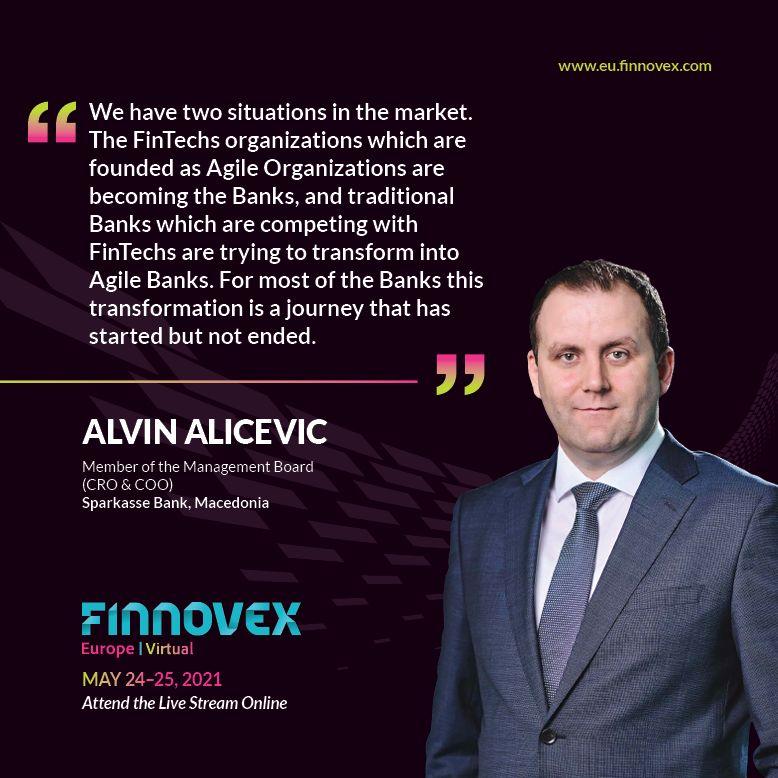Speaker Interview- Alvin Alicevic
HOME / Speaker Interview- Alvin Alicevic

Alvin Alicevic (CRO and COO) is a member of the Management Board of Sparkasse Bank (Member of the Styrian Sparkasse and Erste Group), North Makedonija AD Skopje.
He is responsible for Risk Management, Organization and IT, legal affairs, Banking Operations, Compliance & Anti-money Laundering and Assets & Liabilities Management.
He currently serves as the president of the Risk Management Committee and IT Committee of the Sparkasse Bank and a member of the Supervisory Board of Sparkasse Leasing Skopje.
MR Alvin Alicevic will be speaking virtually at the Finnovex Europe Summit. Please have a look at his view on our upcoming Leading Summit on Financial Services Innovation and Excellence held Virtually on 24th – 25th May 2021 ( Attend from anywhere 💻🖥📱 )
Q- In relation to your current role, how would you describe an ideal Agile Bank that is ready for the “New Normal”?
The “New normal“ has sped up the process of changes within the Banking industry, challenging the existing business models. It has affected the internal organization, access to clients, products and customer experience, operative’s efficiency and decreased revenue. An ideal Agile Bank is adaptive and able to respond to the challenges, quickly adapt to the busines model and meet customers and stakeholders’ expectations.
Q- What are the vital elements that organizations need to put in place to ensure they are ever-ready for an unpredictable world?
The Banking industry today is a typical VUCA environment. It is difficult to predict the behavior of the market and durability of existing business model. In order to be ready to operate in this environment, the Banks should leverage on technologies, be flexible for organizational changes and shape the culture open for innovation.
Q- The world as we know has become more technologically advanced, how can Banks cushion the effects of cyber threats while leveraging technologies to meet the needs of their customers?
The world is becoming more technologically advanced in every aspects. Although this advancement is reflected in positive changes for the customers, it has also opened additional possibilities for cyber threats that are often “front runners” in utilizing new technology. In order to reduce negative effects, Banks should have a balanced approach in investing the resources in new technologies to meet the expectation of customers, as well as controlling cyber security risk which is becoming more and more important.
Q- Within your organization, can you highlight 3 key steps that have been taken to ensure you remain an Agile Bank?
We have two situations in the market. The FinTechs organizations which are founded as Agile Organizations are becoming the Banks, and traditional Banks which are competing with FinTechs are trying to transform into Agile Banks. For most of the Banks this transformation is a Journey that has started but not ended. So instead of highlighting 3 key steps to remain as an Agile Bank, I will highlight five key elements which should be tackled in this transformation process. These elements are: strategy, structure, process, people and technology. Missing of any of these elements will not lead to successful transformation and later to remain Agile Bank.
Q-Delegates are certainly getting ready to attend this conference, would you like to give any advice to them?
The content of the conference is very interesting and tackle current challenges that we are facing on the market. Participants should use opportunity to get a different view on the same challenges and utilize in their context.
Q-What is your expectation from the Technology solution providers/ Vendors in the Financial Industry? What would you like to hear from Fintech companies in terms of challenges faced by the Banking Industry?
My expectation goes directly to constant improvements of collaboration between Vendors and Financial Industries in order to provide best experience for our clients. For the Fintech companies, the challenges of business model in term of the profitability would be interested.